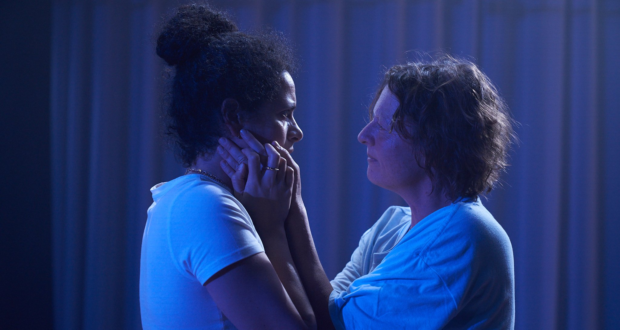A Raw and uncomfortable view of a couple’s grief and guilt — with a touch of the taboo.Summary
Rating
Good
‘The Island that never dies’ says Ada, played by Rebecca Crankshaw, at the beginning of the play. The opening scene has her seated cross-legged on the floor in loose-fitting shabby clothes. As she awaits the outcome of her son’s life-threatening operation she plays with a couple of plastic cups of water and narrates the history of the Hunga Tonga volcanic island. The focus on the island itself is unclear at first — the volcano erupts and it all starts over. The hypnotic motion is akin to a game of cups, and perhaps it is meant to be a self-soothing, repetitive motion through the interminable waiting. Her monologue, although intriguing, is overshadowed by her rhythmic pouring of water from one plastic cup to another.
Ada’s partner, Laura (Rebecca Banatvala), a cop and 15 years younger, swoops onto the stage with an energy that is at odds with Ada’s melancholy mood. She’s complaining about the coffee while Ada’s mindset is on a different path and the tension is palpable. They are a couple sharing a horrific and emotionally drawn-out few hours following their son Samuel’s accident. Ada looks towards the clock on the TV tower: it is four o’clock in the morning, and they’ve been in the waiting room for hours with no news.
Samuel is a severely impaired special needs child, who has fallen out of the window of their apartment. The two are trapped, waiting for the verdict from the doctors, while battling with their guilt and grief. Both are trigger-happy and ready to cast blame. They question how their relationship will be if he dies and they are in some way freed by their loss. Both actors gave a stellar performance, feeding the audience their backstories directly in individual snippets, then transitioning back into dialogue to draw out their emotions and expose their true thoughts. Their individual coping mechanisms grate on each other as they fight through the grief, guilt and vulnerability of the situation. It brings out a blunt and painful honesty that they were never able to voice over the last eleven years. What would their lives have been like, if not for the birth of their son? Can they turn back time and start again? Or have they grown too far apart, irrevocably changing the dynamic of what they once were? The Spanish writer Juan Carlos Rubio plays with these uncomfortable emotions of guilt and selfish desires, venturing into taboo topics, and the translation by Tim Gutteridge has captured these well.
Sorcha Corcoran’s set design is brilliant. Sparse and clinical, it depicts a hospital waiting room accurately, right down to the tacky red plastic chairs lined up on the red linoleum with a grey border demarcating their domain. This clinical atmosphere is further brought to ‘light’ with the symmetrical fluorescent tubes. The harsh lighting adds to the atmosphere, emphasising the location, and compelling the pair into introspection.
As the play draws to a close Ada says again “The Island that refuses to die”, her voice raw and worn out, now referring to her son, bringing the opening monologue somewhat into perspective. Having read the synopsis of the play in the programme, the audience is aware of the premise of this angsty piece from the very start, which unfortunately takes away the element of surprise. Although some scenes are a little drawn out, it is still raw, uncomfortable yet compelling to view.
Written by: Juan Carlos Rubio
Translated: Tim Gutteridge
Directed by: Jessica Lazar
Set Design by: Sorcha Corcoran
Associate Set and Costume Design by: Olivia Davies
Music Composed and Sound Design by: Odinn Own Hilmarsson
Lighting Design and Technician by: Alex Forey
Stage Manager: Elisa Pulido
The Island plays at the Cervantes Theatre until 21 Oct. Further information and bookings can be found here.
 Everything Theatre Reviews, interviews and news for theatre lovers, London and beyond
Everything Theatre Reviews, interviews and news for theatre lovers, London and beyond



